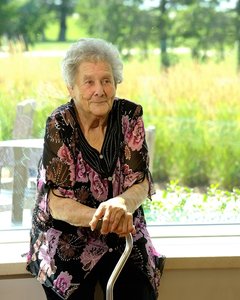After receiving a grim prognosis, SBL Regional Cancer Center gives new hope to Joyce Curtis.
Joyce Curtis had given up hope when she visited Sarah Bush Lincoln’s Regional Cancer Center for the first time.
“I was a cancerous mess and I was scared to death,” Joyce said. “I had given up. I’ll admit that.” It all started when Joyce suffered a mild stroke at a family gathering in June 2017. She was rushed to the hospital by ambulance where doctors detected two blocked arteries. While those blocked arteries were serious enough to cause a stroke, they didn’t concern her cardiologist nearly as much as the discovery made two weeks later when Joyce went in for a follow-up CT scan.
“That’s when they noticed the spots on her lungs and lymph nodes,” Joyce’s daughter, Norma Blythe, said. “They did a biopsy, and she was diagnosed with stage 4 non-small cell lung cancer.”
Though Joyce has smoked since she was a teenager, she was caught off-guard by the news, because she hadn’t had any symptoms. Her health quickly deteriorated, and Joyce landed in the hospital before she was able to meet with cancer specialists to discuss a possible treatment plan. When an oncologist at another hospital gave her a grim prognosis that included very little chance of survival, Joyce sought a second opinion at the SBL Regional Cancer Center.
Joyce immediately felt newfound energy after meeting SBL Regional Cancer Center Oncologist Abdur Shakir, MD, for the first time. “Dr. Shakir was awesome with her,” Norma said, recalling her mother’s initial consultation with Dr. Shakir. “They hit it off right away. He explained things to us in medical terms, but then he put them in words that we could understand.”
Since Joyce had numerous tumors and her cancer was widespread, surgery wasn’t an option. Instead, Dr. Shakir recommended beginning radiation therapy right away, and he ordered DNA testing to see if immunotherapy would work for her. In August 2017, Joyce began a series of 10 radiation treatments with Radiation Oncologist Seong Cho, MD. Joyce then learned that she was a good match for Keytruda, a new type of cancer drug that unleashes the body’s immune system to attack tumor cells. In September 2017, Joyce started receiving infusions of that immunotherapy drug at three-week intervals.
She and her family have been amazed by how well the treatment has worked. In fact, Joyce was deemed cancer-free after a CT scan on November 30, 2017! “I praised God, and then I praised my doctors,” Joyce said. “If you’ve got God and these doctors on your side, then you can do anything.” Joyce has been in remission ever since, though she continues to receive infusions of Keytruda every three weeks to keep the cancer at bay.
Joyce looks forward to visiting her “cancer family” each month. With her feisty personality, she is quick to let those around her know what’s on her mind. “I don’t put on airs for anyone,” she said. “I come here and we get to joking around and acting up. I have a good time. It’s like coming to see family that I haven’t seen for three weeks, and that’s who I consider these people – part of my family. I love them all.” Joyce definitely makes her presence known during her visits. “She makes us all laugh,” oncology nurse Bing Bennett, RN, said.
Never one to dwell on the past, Joyce swears that she never suffered from negative side effects of the treatment. Her daughter recalls things a little differently. “There were times when it made her weaker than normal,” Norma said. “Once she found out she was in remission, that’s when she got back to being her spunky self again, because, for a while, she wasn’t spunky at all.” Since having the stroke, Joyce has relied on a cane for stability, and she needed oxygen therapy until November 2018.
At nearly 80, Joyce deals with life as it comes. She raised six children in Effingham County with husband Lenvil, who died more than 30 years ago. She and Norma recalled that the family was always outside: working in the garden to put food on the table, chopping wood, fishing and having fun. “My mom would be out there having foot races with us kids down the side of the road— and she’d beat us too!” Norma said.
Fiercely independent, Joyce is sometimes hesitant to let people in, but she is grateful for the instant connection that she made with Dr. Shakir. “Honestly, I thought I was dying, and I guess I was, but I came up here and away we went – and I can’t praise Dr. Shakir enough,” she said. “He isn’t the type of person who says, ‘Well I’m the doctor and you’re going to do whatever I say.’ He’ll sit and talk to you and find out how you’re feeling.” Norma also likes the way that Dr. Shakir quashes patients’ fears. “I’ve asked what do we do when the Keytruda stops working and he smacks my hands and says ‘Then we have Plan B, C and D,’” she said.
Lung cancer is the second most common cancer among men and women in the United States, but it causes the most cancer-related deaths — more than colon, breast and prostate cancers combined. Although disease rates have declined along with smoking rates, lung cancer is still responsible for one in four cancer deaths in the U.S.
In a way, Joyce considers her cancer a blessing. “If I hadn’t gotten cancer, then I wouldn’t have all these wonderful people in my life,” she said. “I’m going to live as long as God wants me to, and that’s just it.”
For more information or to make an appointment at the Sarah Bush Lincoln Regional Cancer Center, call 217 258-2250.

